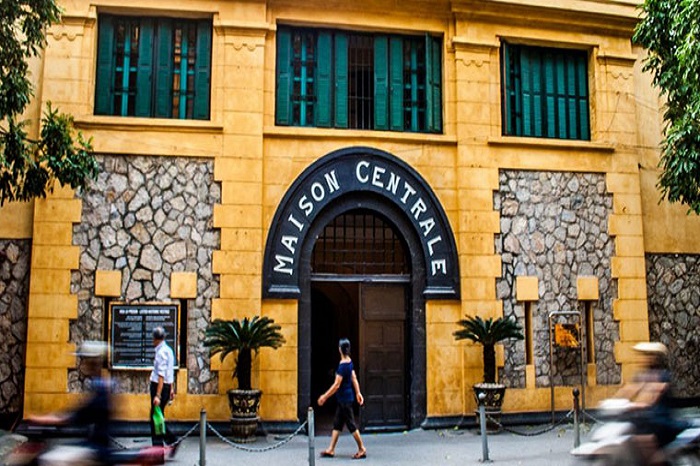
Hoa Lo Prison in Hanoi
- on Nov 10, 2020 By: Ngoc Nguyen
The Vietnamese capital Hanoi is a must-see cultural stop-over during your trip to Vietnam. Among all the cultural sights that the capital has to offer visitors, Hanoi's Hoa Lo Prison is an interesting visit to experience Hanoi’s contemporary history. It’s a moving visit where the Hoa Lo prison in Hanoi, over a hundred years old, reveals its heavy past to visitors.
History of Hoa Lo Prison
Built by the French colonial authorities at the end of the 19th century, called the central house at the time, the Hoa Lo prison opened its doors in 1896. It was the largest prison in Indochina in that period and was intended to imprison the Vietnamese patriots and revolutionary fighters in order to strengthen its control of the rise of independence. The prison complex consisted of a prison, a court, and was the headquarters of the secret police.
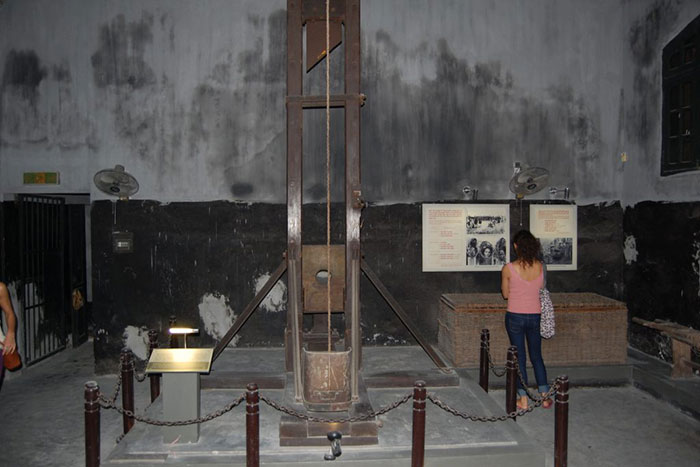
It was also a place of torture and execution. Hanoi Central House was known for its extremely severe detention conditions and concentration camps. More than 2.000 prisoners were crowded there while the premises could only accommodate 500. It then became a revolutionary hotbed where all the resentments against the brutal authority of the colonial regime were concentrated. The first wife of General Vo Nguyen Giap, military hero of Vietnamese independence and architect of the French debacle in Dien Bien Phu, died at the central house of Hanoi, fuelling his hatred of the French colonizing power.
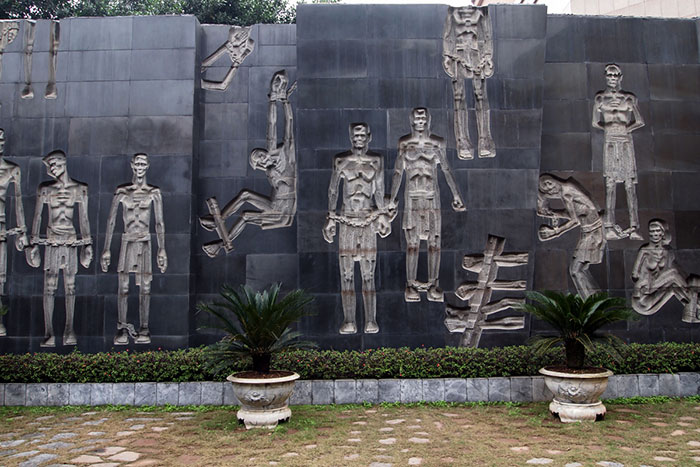
After the departure of the French in 1954, the central house became Hoa Lo Prison as it opened in the eponymous street. The Vietnamese authorities imprisoned anti-communists and common criminals there. During the Vietnam War, from 1963 to 1973, the Hoa Lo prison in Hanoi imprisoned the American pilots whose planes had been shot down during the bombings in the North of the country. Shot down in 1966 over Hanoi during a bombing mission, US pilot Douglas Peterson was jailed for six and a half years in what US Navy pilots ironically called th "Hanoi Hilton." In 1997, he became the first American ambassador to Vietnam since the end of the war marking the entire reconciliation between communist Vietnam and the first world power. Another famous prisoner held at the "Hanoi Hilton" is late Republican Senator and US presidential candidate John McCain, who recounted his years in captivity in "Faith of my Fathers".
Today, Hoa Lo Prison has become a hotel and shopping complex. A part was saved and classified as a historical monument in 1997 and houses a museum.
Discovery of the Hoa Lo prison museum in Hanoi
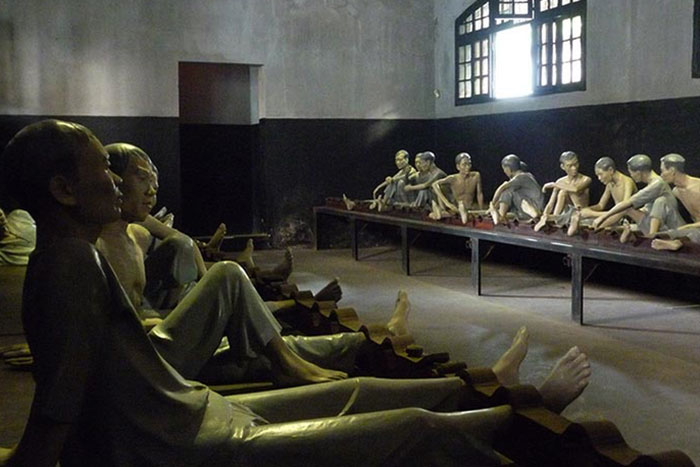
The museum is made up of three two-storey buildings where an impressive scenography evokes the harsh prison world that will not leave anyone indifferent. One can discover the common cells for men and women where chained mannequins illustrate the appalling conditions of detention and the even more squalid cells for prisoners in solitary confinement. The atmosphere is intentionally scary and oppressive so that visitors can understand the harshness of the place. We can also observe the many objects of torture used by the jailers. After this appalling scene, you will discover the memorial which commemorates and glorifies the Vietnamese political prisoners who suffered abuse. We can also see several original documents from the French colonial authorities, photos of Vietnamese prisoners but also American prisoners during their captivity at the “Hanoi Hilton”.
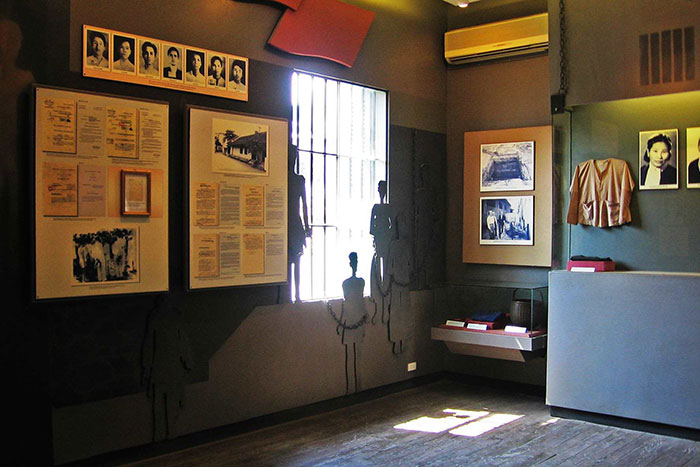
A little sweetness in this brutal world
How about a gentle recovery from your emotions after the poignant visit to Hoa Lo Prison? About a hundred metres away is one of Hanoi's most gourmet addresses: Maison Marou. The Marou chocolatiers develop all their gourmet creations from Vietnamese cocoa from the Mekong delta or the foothills of the Cordillera Annamitique. It’s a 100% artisanal production that honours the rich Vietnamese terrier. A real chocolate factory initiated by two French people, Vincent Mourou and Samuel Maruta, where you can observe the process of making chocolate and pastries. In this place appreciated by gourmets, you can drink a coffee or a Vietnamese hot chocolate accompanied by some chocolate delicacies with double culture such as the gourmet "Paris-Saigon" or classics of French pastry such as éclairs, religieuse or opera. An adjoining shop will allow you to bring back boxes of chocolates or grand cru bars that have just been made before your eyes.
Related articles:
>> Follow the roads of craft villages around Hanoi (part 1)
>> Hanoi's 10 Best Museums to Visit
>> What to do in Hanoi at night? 7 ideas for nightlife in Hanoi
 Español
Español Français
Français







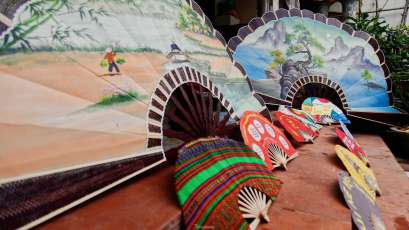

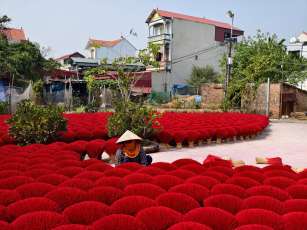
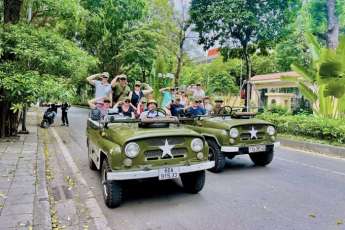
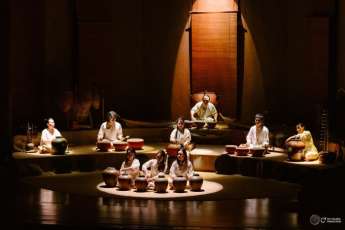
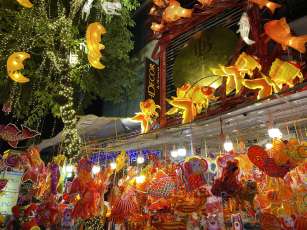







Timothy O Tool
on Feb 23, 2026Timothy William Groh
on Feb 23, 2026TwelmSC
on Feb 20, 2026Morgane Ter Cock
on Dec 18, 2025HerbertPhomaMS
on Oct 19, 2025